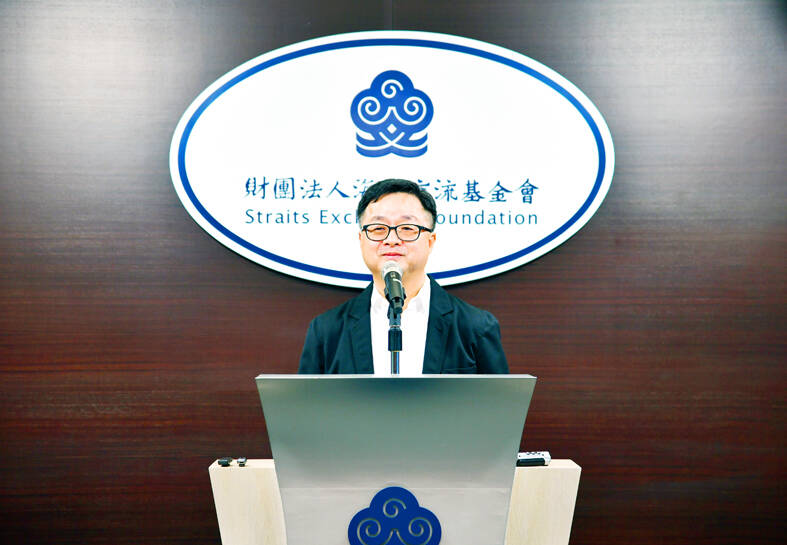The Straits Exchange Foundation (SEF) on Friday issued a warning to students intending to study in China to be wary of people offering “campus loans,” as Chinese students who took out the loans and were unable to pay them back are reported to have faced coercion and even forced to provide nude photographs as debt repayments.
SEF Secretary-General Luo Wen-jia (羅文嘉) said the program attempts to attract students by saying the loans would be low-interest and provided quickly.
However, the real interest rate could be as much as 200 percent, he said.

Photo courtesy of the Straits Exchange Foundation
The foundation, a quasi-official intermediary body authorized by the government to negotiate matters of a technical or business nature with China, warned students last week about the campus loans at an orientation meeting for students about to begin studying in China.
The event also invited former and current Taiwanese students in China to provide new students with more information on living in China.
On Friday, Luo said that students about to begin their studies in China should be wary of people offering such loans.
Students should avoid taking out loans from unknown individuals or organizations online, he added.
Separately, Luo cited data from South Korea’s Custom’s Service which showed that over the past four years, the number of Chinese-made goods, including stationery, clothing, toys and accessories, containing harmful substances imported into South Korea has increased significantly.
The data showed that more than 30 percent of the 83 items inspected contained residual amounts of heavy metals that far exceeded South Korean standards and could cause serious harm to people’s physical health.
The SEF also cited an incident of a 10-year-old girl in the UK who was severely burned after using nail polish sold on a Chinese e-commerce platform, and a case in Japan where a person developed necrosis after they used an ointment advertised to be a mole remover, which they also purchased from a Chinese e-commerce platform.
Luo said these incidents are a reminder for Taiwanese to be cautious when purchasing items from Chinese e-commerce platforms, especially cheap products.
The SEF has received multiple complaints in recent years about Chinese platforms, such as false advertisements, paying for products that are not delivered and receiving faulty products, he added.
It is difficult to receive compensation, as such platforms do not offer systematic guarantees for their customers, but the SEF would continue to help those who have encountered issues with their purchases, he said.

CAUTION: Based on intelligence from the nation’s security agencies, MOFA has cautioned Taiwanese travelers about heightened safety risks in China-friendly countries The Ministry of Foreign Affairs (MOFA) yesterday urged Taiwanese to be aware of their safety when traveling abroad, especially in countries that are friendly to China. China in June last year issued 22 guidelines that allow its courts to try in absentia and sentence to death so-called “diehard” Taiwanese independence activists, even though Chinese courts have no jurisdiction in Taiwan. Late last month, a senior Chinese official gave closed-door instructions to state security units to implement the guidelines in countries friendly to China, a government memo and a senior Taiwan security official said, based on information gathered by Taiwan’s intelligence agency. The

The National Immigration Agency (NIA) said yesterday that it will revoke the dependent-based residence permit of a Chinese social media influencer who reportedly “openly advocated for [China’s] unification through military force” with Taiwan. The Chinese national, identified by her surname Liu (劉), will have her residence permit revoked in accordance with Article 14 of the “Measures for the permission of family- based residence, long-term residence and settlement of people from the Mainland Area in the Taiwan Area,” the NIA said in a news release. The agency explained it received reports that Liu made “unifying Taiwan through military force” statements on her online

Taiwan Semiconductor Manufacturing Co (TSMC), the world’s largest contract chipmaker, said yesterday that it is looking to hire 8,000 people this year, at a time when the tech giant is expanding production capacity to maintain its lead over competitors. To attract talent, TSMC would launch a large-scale recruitment campaign on campuses across Taiwan, where a newly recruited engineer with a master’s degree could expect to receive an average salary of NT$2.2 million (US$60,912), which is much higher than the 2023 national average of NT$709,000 for those in the same category, according to government statistics. TSMC, which accounted for more than 60 percent

Tung Tzu-hsien (童子賢), a Taiwanese businessman and deputy convener of the nation’s National Climate Change Committee, said yesterday that “electrical power is national power” and nuclear energy is “very important to Taiwan.” Tung made the remarks, suggesting that his views do not align with the country’s current official policy of phasing out nuclear energy, at a forum organized by the Taiwan People’s Party titled “Challenges and Prospects of Taiwan’s AI Industry and Energy Policy.” “Taiwan is currently pursuing industries with high added- value and is developing vigorously, and this all requires electricity,” said the chairman